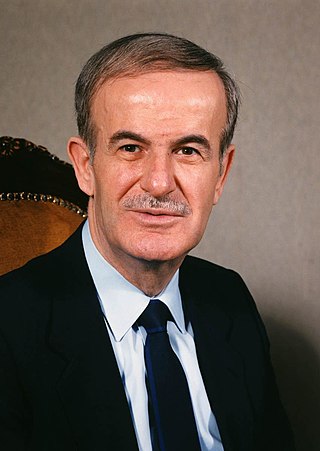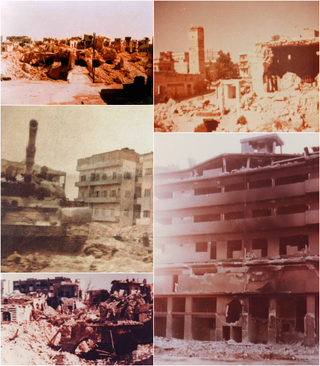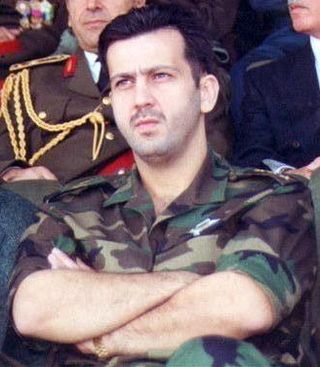
Ribal al-Assad (born 4 June 1975) is a Syrian businessman and political activist. He is the founder and Director of the Organisation for Democracy and Freedom in Syria (ODFS) and the Chairman and Founder of The Iman Foundation.

Ribal al-Assad (born 4 June 1975) is a Syrian businessman and political activist. He is the founder and Director of the Organisation for Democracy and Freedom in Syria (ODFS) and the Chairman and Founder of The Iman Foundation.
Ribal al-Assad was born in Damascus, the 13th of 16 siblings. He is the son of Rifaat al-Assad and his third wife Line Al-Khayer, sister-in-law of the late Saudi king Abdullah bin Abdulaziz, [1] and is thus a member of the al-Assad family. His father, Rifaat al-Assad, a younger brother of the late President Hafez Al-Assad, was a powerful security chief and commander of the Defense Companies, who was responsible for the 1982 Hama massacre. After attempting a coup d'état, he and his family went into exile in France, then the UK. Ribal, at the age of 9, and his family then moved to Paris, where he continued to live until the age of 16. At the age of 16, al-Assad moved to the US and began high school in New York and Houston, before attending university in Boston. He holds a Bachelor of Business Administration degree from the InterAmerican University, New York, US and an MA from the University of Leicester, United Kingdom. [2]
In 2006, he became director of the London Bureau of the Arab News Network (ANN), a family owned television channel founded in 1997. After he left ANN, he founded the Organisation for Democracy and Freedom in Syria (ODFS) in 2009 and became its director. The organization did not gain prominence until 2010, when Robert Fisk of The Independent interviewed Ribal al-Assad. Of his cousin, Bashar al-Assad, Ribal said: "He is still governing under the ghost of his father. Each person in Syria has an interest in the secret service. Bashar should have declared national unity as soon as he took over. He did things bit by bit, with internet cafes and so on. But it was not enough. There was no real change." [3]
He also appears from time to time on TV and in the print media as a commentator on politics and current events. [4] [5] [6] [7]
Ribal has been critical [8] of the Syrian National Council since its inception. He has pointed-out how it has been overwhelmingly made up of members of the Muslim Brotherhood, who were not elected through a democratic process but hand-picked by Turkey and Qatar. He has also been critical of the Free Syria Army (saying it was made of Islamist extremist groups) and its Supreme Military Council (saying it was exclusively made up of Salafi extremist groups).
Ribal al-Assad’s work as Chairman of the Iman Foundation has focused on promoting interfaith and inter cultural dialogue and challenging extremism across the world. The organisation is not-for-profit and is committed to "promoting inter-religious and inter-cultural dialogue, intra-religious dialogue and challenging extremism and promoting mainstream voices". [9]

Hafez al-Assad was a Syrian statesman and military officer who served as the 18th president of Syria from 1971 until his death in 2000. He had previously served as prime minister of Syria from 1970 to 1971 as well as regional secretary of the regional command of the Syrian regional branch of the Arab Socialist Ba'ath Party and secretary general of the National Command of the Ba'ath Party from 1970 to 2000. Hafez al-Assad was a key participant in the 1963 Syrian coup d'état, which brought the Syrian regional branch of the Arab Socialist Ba'ath Party to power in the country.

Bashar al-Assad is a Syrian politician who is the current and 19th president of Syria since 17 July 2000. In addition, he is the commander-in-chief of the Syrian Armed Forces and the secretary-general of the Central Command of the Arab Socialist Ba'ath Party, which nominally espouses a neo-Ba'athist ideology. His father and predecessor was General Hafiz al-Assad, whose presidency in 1971–2000 marked the transfiguration of Syria from a republican state into a de facto dynastic dictatorship, tightly controlled by an Alawite-dominated elite composed of the armed forces and the Mukhabarat, who are loyal to the al-Assad family.

The Hama massacre occurred in February 1982 when the Syrian Arab Army and the Defense Companies paramilitary force, under orders of president Hafez al-Assad, besieged the town of Hama for 27 days in order to quell an uprising by the Muslim Brotherhood against the Ba'athist government. The campaign that had begun in 1976 by Sunni Muslim groups, including the Muslim Brotherhood, was brutally crushed in an anti-Sunni massacre at Hama, carried out by the Syrian Arab Army and Alawite militias under commanding General Rifaat al-Assad.

Bassel al-Assad was a Syrian engineer, colonel, equestrian and politician who was the eldest son of Syrian President Hafez al-Assad and the older brother of (later) President Bashar al-Assad. It was widely expected that he would succeed his father as President of Syria until he died in a car crash in 1994.

Rifaat Ali al-Assad is the younger brother of the late President of Syria, Hafez al-Assad, and Jamil al-Assad, and the uncle of the incumbent President Bashar al-Assad. He was the commanding officer of the ground operations of the 1982 Hama massacre ordered by Hafez al-Assad.

Major General Maher al-Assad is a Syrian military officer and commander of the Syrian Army's elite 4th Armoured Division, which, together with Syria's Military Intelligence, forms the core of the country's security forces. He is the younger brother of Syrian president Bashar al-Assad, and also a member of the Central Committee of the Syrian Ba'ath Party.

Assef Shawkat was a Syrian military officer who was the Deputy Minister of Defense of Syria from September 2011 until his death in July 2012.
Jamil al-Assad was a younger brother of the late Syrian president Hafez al-Assad, and the uncle of present Syrian leader Bashar al-Assad. He served in the Parliament of Syria, called the majlis ash-sha'b from 1971 until his death. He was also commander of a minor militia.

The Arab Democratic Party (ADP) is a Lebanese political party, based in Tripoli, in the North Lebanon Governorate. Its current leader is Rifaat Eid.

The al-Assad family, also known as the Assad dynasty, is a Syrian political family that has ruled Syria since Hafez al-Assad became president of Syria in 1971 under the Ba'ath Party. After his death, in June 2000, he was succeeded by his son Bashar al-Assad.
Rami Makhlouf is a Syrian businessman and a maternal cousin of president Bashar al-Assad. At the beginning of the Syrian civil war in 2011, he was considered one of Syria's richest and most powerful men. According to Syrian analysts, he is part of al-Assad's inner circle and no foreign company could do business in Syria at the time without his consent and partnership.
The 1999 Latakia protests were violent protests and armed clashes, which erupted in Latakia, Syria following 1998 People's Assembly's Elections. The violent events were an explosion of a long-running feud between Hafez al-Assad and his younger brother Rifaat. Two people were killed in fire exchanges of Syrian police and Rifaat's supporters during police crack-down on Rifaat's port compound in Latakia. According to opposition sources, denied by the government, the protests left hundreds of dead or injured.

The Syrian opposition is the political structure represented by the Syrian National Coalition and associated Syrian anti-Assad groups with certain territorial control as an alternative Syrian government.
This article details the Syrian government's response to protests and civilian uprisings of the Syrian revolution which began in early 2011, that unravelled the socio-political stability of Syria, eventually plunging the country into a nationwide civil war by mid-2012.
Jamil Hassan was the head of the Syrian Air Force Intelligence Directorate and a former close adviser to President Bashar al-Assad. He is reported to be under house arrest.

Mohammed Nasif Kheirbek known as Mohammed Nasif or Abu Wael, was the former Deputy Vice-President for Security Affairs in Syria. He was a close adviser of Syrian President Bashar al-Assad and served as Syria's point-man for its relationship with Iran and Lebanon's Shia militias. Nasif was among several officials sanctioned by the European Union for the use of violence against civilians during the Syrian civil war.
Shafiq al-Fayadh was a Syrian military officer and former commander of the Syrian Army's 3rd Division and a close adviser to President Hafez al-Assad. He was also one of the members of his inner circle.
Ali Haydar, known as the "Father of the Syrian Special Forces", was a Syrian military officer who was the commander of the Syrian Special Forces for 26 years. He was a close confidant to President Hafez al-Assad and one of the members of Assad's inner circle. Born in the village of Hallet Ara, Haydar was a member of the Ba'ath Party from his youth. He was commissioned into the Syrian Army in 1952 after a stint studying at the Homs Military Academy. After the Ba'ath Party seized power in a 1963 coup d'état, Haydar was put in charge of Syria's special forces and supported al-Assad in his rise to the presidency. During this time he was deployed to Lebanon during their civil war. Haydar opposed the 1984 coup d'état attempt led by Rifaat al-Assad, instead remaining loyal to Hafez al-Assad. After suffering an aneurysm and leaving his post in 1988, he returned to lead the special forces again in the early 1990s. At the time a Major General, he was formally removed from his position and then imprisoned in August 1994, though he was treated well during his brief prison stay and was released without a trial or public humiliation. Haydar died in Latakia at the age of 90.
The European Strategic Intelligence and Security Center (ESISC) is a self-described think tank and lobbying group dealing with issues related to terrorism and security. ESISC notes on its website that its "lobbying operations can defend an industrial portfolio, the economic opening of a new market, or the political interests of a state."

Bahjat Suleiman, also known as Bahjat Sulayman, was a Syrian Ambassador to Jordan and head of the internal branch of the Syrian General Intelligence Directorate (GID), also known as Branch 251, in Syria. He was instrumental in the accession of Syrian President Bashar Al-Assad to the presidency and was considered to be his confidant and mentor, and in his "inner circle."